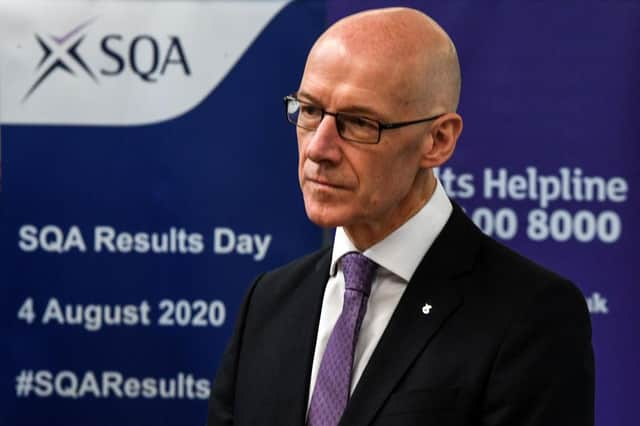John Swinney: the life and career of SNP Education Secretary facing vote of confidence over downgraded SQA exam results


Education Secretary John Swinney faces a confidence vote in the Scottish Parliament later this week following the downgrading of children’s exam results.
The veteran MSP has borne the brunt of fury from pupils, parents and teachers with claims that children from deprived backgrounds’s results were more likely to be negatively affected by changes.
Advertisement
Hide AdAdvertisement
Hide AdThe 56-year-old has promised to “act quickly” in addressing the issue, admitting that the government may have been wrong in their methodology.
He is set to present an alternative approach to grading this Tuesday.
A former leader of the Scottish National Party, Swinney’s career now hangs in the balance.
Where was John Swinney born?
Born in Edinburgh in 1964 to a garage manager, John Swinney attended Forrester High School in the West of Edinburgh.
Advertisement
Hide AdAdvertisement
Hide AdIt was while at Forrester that John Swinney dipped his toe in politics for the first time, joining the SNP aged just 15, after he had reportedly been disappointed by Scotland’s portrayal at the Commonwealth Games.
Seven years later in 1986 he contested the position of SNP national secretary, seeing off stiff competition from a veteran activist.
At age 22 he assumed the role before completing his finals at the University of Edinburgh where he studied politics.
Growing influence in the SNP
From 1987 to 1997, John Swinney would assume increasingly senior roles within the party, earning the title of vice convenor in 1992 and then deputy leader which he held from 1992 to 1997.
Advertisement
Hide AdAdvertisement
Hide AdDuring his early career, Swinney would act as a research officer for the Scottish Coal Project, as well as a strategic planner with Scottish Amicable.
He would back Margaret Ewing in the 1990 leadership contest, but would grow a close relationship with the winner Alex Salmond.
At the 1997 general election, Swinney clinched the seat of Tayside North, winning the same constituency at local elections two years later.
During his time at Westminster, Swinney would side with Labour in their handling of the European beef ban, describing Tory opposition as barefaced cheek.
Advertisement
Hide AdAdvertisement
Hide AdHe would later step down from his Westminster seat in 2001 in an attempt to dedicate more time to his role in the Scottish Parliament
At Holyrood Swinney emerged as a spokesman on enterprise and lifelong learning.
When Alex Salmond stepped down as party leader in 2000, Swinney assumed his position, seeing off Alex Neil in a leadership race.
Despite the victory, Swinney would struggle during his time as leader following poor results at the 2001 general election and local elections two years later.
Swinney stepped down in 2004.
How did he become Education Secretary?
Advertisement
Hide AdAdvertisement
Hide AdWhen SNP became the largest party in Scotland in 2007, Swinney was handed the cabinet position of Finance Secretary, a role which he would stay in until 2016.
During his tenure Swinney would let the Scottish Variable Lapse due to the tax mechanism not being funded.
This would lead to accusations of Swinney abusing power, but he would later be redeemed when the Scottish Government stated that collection of the tax had been made impossible by an out-of-date HMRC computer system.
In 2016 Swinney was moved roles for the first time in nine years from Finance to Education Secretary.
Advertisement
Hide AdAdvertisement
Hide AdThe Veteran MSP has held the role of deputy leader since 2014.
Why was John Swinney criticised over SQA exam results?
Following the release of exam results last Tuesday hundreds of parents and young people were expressing their fury about grades being reduced, many from passes to fails, by the Scottish Qualification Authority’s “moderation”.
The moderation system produced by the Scottish Qualifications Authority (SQA) and approved by the Scottish Government when this year’s exams were cancelled, saw 26.2% of grades changed during the moderation process based on criteria including schools’ historic performances.
Accusations have been made that schools from deprived areas have been worst affected by the downgrading.
Advertisement
Hide AdAdvertisement
Hide AdBlame has landed with John Swinney with former First Minister Lord McConnell saying the targeting of pupils was “deliberate”.
Scottish Greens Education Spokesperson Ross Greer said: “The Education Secretary has so far failed to grasp the scale of the problem, but there is still a limited amount of time to fix it. Mr Swinney must show some humility, admit he got this wrong and set about fixing it.
“Young people who are making important choices about their futures need to see an urgent resolution to this avoidable mess.”